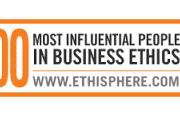Featured Ethics [and Governance] Scholar for February: Andrea Bonime-Blanc
 Interview with Andrea Bonime-Blanc, Author and CEO of GEC Risk Advisory
Interview with Andrea Bonime-Blanc, Author and CEO of GEC Risk Advisory
What are your main areas of research/work?
Even though I teach at a couple of universities (including NYU and ESADE) and hold a PhD (in political science), I am not a scholar in the traditional sense of the word. I have always worked as a lawyer or corporate executive for global companies and four years ago started my own strategic advisory firm (GEC Risk Advisory). That said, my current advisory practice falls under the general rubric of “Strategic ESG (environmental, social and governance) Risk and Value Creation”. Subtopics include:
- Governance (including cyber-risk governance)
- Ethics and culture
- Strategic risk
- Reputation risk
- Crisis preparedness
- Transforming risk into value
Sometimes clients ask me to do practical research – one of my favorite recent client engagements was preparing a white paper for the board of directors of a leading African bank on future trends in global corporate responsibility. I also use my own research on cutting edge topics like reputation risk and cyber-risk governance to push the limits of where we currently are on finding solutions to current serious challenges in the marketplace, focused almost exclusively on what the board and the c-suite need to know.
How does strengthening governance help create value in companies?
Governance is the sine qua non of any successful, sustainable organization– whether it’s a company, an NGO, a government agency or any other form of organization. Governance is the foundation without which it is not possible to build the other critical components of a resilient organization one of which is a strong ethical culture and system. Governance is the top of the “tone from the top”.
Good governance must have at least two basic things:
- A properly constituted and sufficiently diverse board that has the background and experience to provide advice and oversight consistent with the mission, vision, values and sector/business of the entity, and
- A board that holds the CEO truly accountable – where it actively leans-in on CEO performance, not only measuring financial results but also systemically factoring in non-financial ESG results.
The connection of governance to value is that with ineffective or bad governance, value will erode and/or be destroyed at some point because a rogue or unaccountable CEO isn’t properly overseen or takes advantage of a weak board (e.g., Massey Mining). It can also occur when both the board and the CEO don’t see the value in understanding risk and integrating risk (including ethics risk) into strategic planning thus missing additional value creation opportunities. Which leads to the connection between good governance and value-creation: in addition to providing better oversight on strictly financial issues and performance, when a board proactively oversees the proper integration of strategic risk into planning, the board creates greater value for the enterprise because of the new opportunities for value creation that sophisticated strategic risk oversight provides.
How does your work on global governance and value creation help companies that want to improve themselves as ethical systems? Where is the intersection between these areas?
Governance and effective ethical systems are deeply and intimately intertwined – where one needs the other. It’s a symbiotic relationship. In fact, in my forthcoming book, Gloom to Boom: How Leaders Transform Risk into Resilience and Value (Greenleaf Publishing – late 2017), I consider these two elements – “True Governance” and “Empowered Integrity” — as the first and most fundamental components of seven that are part of what I call the “Virtuous Cycle of the Resilient Organization”. What I mean by “Empowered Integrity” is a system of ethical culture that is completely supported and modeled by the leadership of the organization where it is safe to speak up and solve issues and concerns at their very incipience.
I am passionate about helping business and financial leaders of organizations understand, tame and integrate their ESG risk (including ethical risk) into their strategy as this will not only extract greater value for their financial bottom line but also create other long term tangible and intangible value in the form of reputation, resilience and sustainability. In my work, I primarily target the board and the c-suite as these leaders need to understand the deep connections and interdependency of governance and ethical systems.
If you could only highlight one paper or research finding (or piece of work that you’ve been involved with) that relates to risk and governance, what would it be and why?
In 2014, I wrote The Reputation Risk Handbook: Surviving and Thriving in the Age of Hyper-Transparency to help boards and executives understand and manage reputation risk, a top 5 strategic risk for boards and c-suites for the past few years, which few tackle in a holistic or systematic way. I am now collaborating with a partner who is a quantitative expert to go a step further: combining the best of the qualitative and the quantitative in reputation risk management.
We just published an e-book Understanding Reputation Risk: The Qualitative and Quantitative Imperative where we introduce our joint approach to managing and overseeing the qualitative and quantitative aspects of reputation risk. Reputation risk management and oversight is an area that is still very new and cutting edge and companies (especially banks) are struggling with how to quantify reputation risk so we’re trying to offer approaches and concepts that can be helpful to them. This is as an example of what I described earlier of the practical research that we do in furtherance of the real world challenges of our clients and prospective clients. We try to get ahead a few steps to identify these challenges, research them and provide early-stage and longer-term solutions.
How has global governance changed in recent years? Is it more reflective of international concerns or primarily focused on issues in individual countries?
Well, you ask a multifaceted question. If we’re talking about global governance as in the postwar global institutions that were created to establish international order and rules after WW2 (NATO, IMF, EU and others), I believe we are living through a period of tectonic change in that kind of global governance that will result in a fundamentally different world order in the next few years. This has very significant strategic geopolitical risks for any type of organization operating internationally and is part of the strategic risk work that I do with boards and executives.
If, however, the question is about the global governance of entities, some change is taking place though I think it is slower than it should be given the vast technological and geopolitical changes that are taking place around us. Indeed, taking a specific disruptive topic (cyber-risk governance) as an example, the traditionally composed board does not have directors that are properly equipped to oversee this novel, complex and fast-moving issue. Another one of my governance pet peeves is that many boards do not have directors with appropriate foreign experience/backgrounds, which prevents these companies from adapting to change and taking advantage of opportunities. In my humble opinion, the diversification of boards to include directors of different ethnic, national, gender, age and expertise backgrounds is an absolute necessity to survive and thrive today. And I am convinced of this regardless of current populist and anti-globalization trends as I believe the world has become irreversibly interconnected and interdependent because of such crucial issues as climate change, technological change, healthcare issues (including possible pandemics) and the potential for cross-border asymmetric terror.
How do you think the c-suite has changed in regard to ethics in recent years? Did the financial crisis dampen appetites for risk or governance and if so, has it returned to the same levels at which it once was?
Great question. It’s hard to tell. I think companies that have heavy-duty regulatory requirements (financial, healthcare, pharma) are more responsible (or scared) than they used to be and have some form or other of an ethics and compliance program in place – the real question is whether these programs are “effective”. Others – sadly, probably the majority of companies – don’t have effective E&C programs and will only consider them when and if they are hit by crisis or scandal and only then will they begin to build at least parts of an effective ethical system. Finally, there are leaders (though a minority) that are genuinely interested in having ethical systems within their organization building resilience and helping to create value. It is a professional pleasure to be able to work with companies like this who get it and realize that there is real stakeholder value to be created from such a focus.
Tell us about one of your current or future projects?
A client project I am thrilled about is for a large global intergovernmental agency that does amazing work for society worldwide that already has an effective ethics program and has asked me to work with them to align it to their five-year strategic plan. This is generally part of work I have been doing for a while focusing on the concept of “Transforming Risk into Value”, researching and developing cases of companies and other entities that have transformed a serious ESG risk into value. These cases have become valuable fodder for client work and workshops on strategy, reputation risk, resilience building and crisis scenario planning. I will be sharing a lot of this work in my forthcoming book for Greenleaf Publishing (late 2017) called, Gloom to Boom: How Leaders Transform Risk into Resilience and Value.
If you could give one piece of governance/value-creation advice to companies, what would it be?
Make sure your board is as diverse as your business (and stakeholders to a certain extent), reflecting industry and geographical expertise as well as governance, risk, ethics, corporate responsibility and other “intangible” experience relevant to your business. We are entering a global era of much greater uncertainty, risk and possible reward (for the smart companies) where the resilient and equipped will win. The era of a pure shareholder value focus is giving way to the era of stakeholder value incorporating the interests of other key, top stakeholders (notably customers and employees). While still primarily focused on the financial aspects of doing business, to be successful, entities must broaden their lens and peripheral vision to include the interests, pressures, risks and opportunities that their most important stakeholders present now and into the future.
If you could give one piece of governance advice to individuals, what would it be?
Follow your passion and even if you’re not a millennial become one when it comes to issues of having a more holistic approach to business, society, environment and governance. The more business opens up to this thinking– as several leading companies like Unilever, L’Oreal and IKEA are doing– the greater your ability to work in a company or entity where you can combine doing good with good returns and creating competitive advantage and reputation opportunity.
Additional questions
Featured video
Featured academic article
- Andrea Bonime-Blanc, “Emerging Practices in Cyber-Risk Governance”, The Conference Board (2015) (see the executive summary);
Featured popular article








